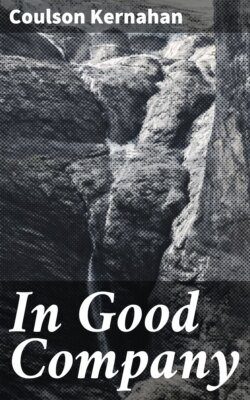Читать книгу In Good Company - Coulson Kernahan - Страница 11
На сайте Литреса книга снята с продажи.
VII
ОглавлениеTable of Contents
“Watts-Dunton writes poetry because he loves writing it,” said Swinburne to me once. “I write poetry, I suppose, to escape from boredom.”
There is truth in the statement, but there is more behind the statement than appears at the first glance.
New and incoming tides of poetry lapped at his feet each morning, and the incoming of each new tide of poetry was to him as fresh, pure, crystalline-sweet, and free, as is the tide that rolls in upon the shore each day from the vastnesses and the sweetnesses of the central sea.
Hence he gave himself up to it, plunged in it, sported in it, with the zeal and rapture of a boy. Had the call to think poetry, dream poetry, write poetry, plunge himself into poetry, come to him as part of a set task, had he been compelled, in the mood or out of the mood, to take up poetry as an occupation, he would have turned from it as the sea-loving swimmer turns from a stagnant pool. It would have been to him the “boredom” of which he had spoken, not the “escape from boredom.”
I have said that the impression I formed of him after my first visit was that of a man who lived in a world of his own—a world which, so far as his body was concerned, was, with the exception of his experiences on and by the sea, bounded, for the greater part of his later life, by the four walls of his home, and by the limits of his daily walk, but which, in the imaginative and mental sense, was illimitable. Human and normal in passion, and in every other respect, as I believe him to have been (so far, that is to say, as genius, which by overbalancing one side of a man’s nature, inevitably necessitates some underbalancing on the other, ever can be said to be normal), he had seemed to me, on the occasion of that first visit, a creature of other flesh and blood than ours, an elusive ethereal poetic essence, rather than a man of like passions to our own.
It had seemed to me as if the busy world, in which other men made love and married, begot children, bought and sold, laboured and schemed—though it lay outside his very door—was a million miles away from the monastic quiet of the book-lined room in which he lived and dreamed and wrote.
I do not say that it was so. All I say is that it had seemed so to me on that first meeting, but I am not sure that the impression I then formed was accurate.
I came away feeling as if I had been in the company of a creature living in an unreal world, whereas now I think that, to the man whom I had left behind in that book-lined room, life was infinitely more real than it is to us. I had left behind me, given over to ecstatic abandonment to the mood of the moment, and believing intensely in the reality and actuality of all which that mood called forth, or created, a child at play with his toys, for in spite of the magnificence and the maturity of his intellect (may I not say because of the magnificence and the maturity of his intellect?) the child lived on and was alive to the last in Algernon Charles Swinburne as it lives in few others.
What he had meant when he spoke of writing poetry “to escape from boredom” was that he was a tired child turning for comfort, self-forgetfulness and consolation to his toys; and to him (happy man!) even his life-work, even Poetry itself, was, in a sense, a toy. That was why to the last he turned to it—an old man in years, though I could never bring myself to think of him as old—with such eager and childlike anticipation. The child heart, which could exult and build up dreams around his toys, remained; but his toys were changed—that was all. That was why he so loved and was so loved by children. They recognised him, bearded man as he was, as one of themselves. That was why he was so instantly at home with them, and they with him. That, too, was why he so revelled in Mr. Kenneth Grahame’s The Golden Age—not with the mild reminiscent and ruminant interest and pleasure of a staid grown-up, chewing the cud of childhood, but with a boy of ten’s actual and intense identification with, and abandonment of himself to the part he was acting, and with all a boy of ten’s natural and innate love of fun and of mischief. I have seen him literally dance and caper and whistle (yes, whistle) with all an eager boy’s rapture, over some new toy treasure-trove, in the shape of a poem, by himself or by a friend, a “find” in the shape of a picture, a print, or a coveted first edition, picked up, during his rambles, at a stall.
“Eccentricity of genius,” you say?
Not at all. It meant merely that his boyhood was as immortal as his genius, as ineradicable as his intellectual greatness.
Warm as was my regard for Algernon Charles Swinburne the man, profound as is my admiration of him as a poet, I am not sure that to this child-side of him must not be attributed much that was noblest and most lovable in his noble and lovable personality, as well as much that was loftiest and most enduring in his work.
Of him we must say, as Mr. William Watson has so finely said of Tennyson, that he
